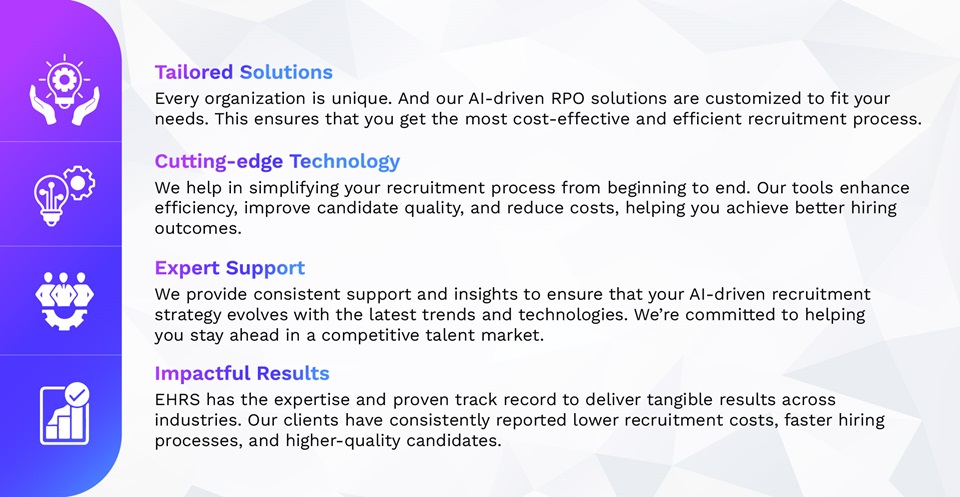The demand for niche skills is consistently increasing. When you combine it with the need for local expertise and the complexities of global logistics, it builds a significant talent shortage that many organizations are experiencing.
More so, if you're an organization with expansion plans, you will find it especially challenging to identify the right talent for critical roles. This situation often leads to frustration among your leadership team as recruitment cycles drag on and existing employees become overwhelmed by additional responsibilities.
Unfortunately, this is a reality that many organizations are facing today.
With talent shortages becoming a global concern, companies need to rethink their hiring strategies. If you, too, are someone who is deeply involved in the HR and recruitment space, then you have seen firsthand how traditional hiring methods fall short in addressing these challenges. Here enters Artificial Intelligence (AI) and Recruitment Process Outsourcing Services (RPO).
This is a game-changing combination that transforms talent acquisition.
But first,
Understanding the Global Talent Gap
It is an ongoing challenge that is caused by multiple factors, including evolving skill requirements, demographic shifts, and technological advancements. As industries such as healthcare, IT, finance, and engineering continue to grow, the demand for specialized professionals far exceeds supply. This disparity forces companies to look beyond their local talent pools and tap into international expertise.

Organizations are trying their best to navigate through this crisis, and a few common challenges that they might come across include:
- Innovation Stagnation: A lack of skilled workers can stall a company’s ability to innovate and stay competitive. Talent gaps in areas such as data science, AI, and software engineering can delay product development and slow down digital transformation efforts.
- Inability to Scale: Companies that can’t find skilled workers may struggle to scale their operations effectively. Without the right expertise, expanding into new markets or launching new products becomes more difficult.
- Increased Turnover: When there is a high demand for specialized talent, it can lead to higher turnover rates because employees may be enticed by better opportunities elsewhere. This creates a vicious cycle of constant recruitment and training, which is costly and time-consuming.
- Diversity Challenges: The talent gap can also aggravate challenges related to diversity and inclusion. Because limited access to a diverse talent pool does impact innovation and create an unbalanced workforce.
How Does an AI-Driven RPO Solution Work?
RPO, combined with AI, is enhancing the efficiency, accuracy, and scalability of recruitment processes. Traditional hiring methods often rely on manual interventions, making them time-consuming and prone to biases.
The real potential of these tools will help organizations improve efficiency by removing limitations through automation, predictive analytics, and data-driven decision-making.
- AI-Powered Talent Sourcing
AI algorithms help analyze vast amounts of data from social media platforms, job portals, media platforms, and professional networks to identify ideal candidates. It matches job requirements with candidate profiles, which significantly reduces the time spent on initial screening and shortlisting. - Automated Resume Screening and Matching
AI-based Applicant Tracking Systems (ATS) scan, filter, and rank resumes based on predefined criteria. Natural Language Processing (NLP) allows these systems to comprehend contextual nuances in resumes, ensuring recruiters focus on the most suitable candidates. - Predictive Analytics for Better Hiring Decisions
AI uses predictive analytics to assess candidates’ potential performance and cultural fit. By analyzing all historical hiring data, AI helps in suggesting the likelihood of a candidate’s success in a specific role, reducing turnover rates and improving hiring quality. - Virtual Assistants/Chatbots
AI-driven chatbots also help streamline candidate engagement by managing initial queries, scheduling interviews, and providing real-time updates. This level of automation enhances the candidate experience while freeing recruiters to focus on strategic aspects of hiring. - AI-Driven Diversity and Inclusion Initiatives
The significant concern in hiring remains 'the bias,' and AI minimizes that by standardizing candidate evaluations, ensuring fair hiring practices, and promoting workforce diversity. AI-based assessments focus solely on skills, experience, and potential rather than demographic attributes. - Automated interview scheduling
One of the most critical logistical challenges is coordinating interviews, especially for roles that require multiple interview rounds. AI recruitment software takes the hassle out of scheduling by synchronizing calendars, finding mutual availability, and automatically sending out reminders to candidates and interviewers. - Candidate Experience
AI recruiting software can enhance the candidate experience by automating routine tasks. It can also provide personalized and timely interactions, leading to a positive candidate experience, regardless of the outcome of the recruitment process.
This can help enhance the overall employer brand and attract top talent.
Advantages of AI-Driven RPO in Bridging the Talent Gap
This combination offers multiple benefits that enable organizations to bridge the talent gap effectively:
- Wider Talent Reach: AI helps identify global talent pools and allows businesses to access skilled professionals beyond geographical constraints.
- Faster Hiring Process: By streamlining recruitment stages, reducing time-to-hire, and ensuring quicker onboarding with automated workflows.
- Cost-Effectiveness: AI optimizes resource allocation, lowering recruitment costs associated with manual screening and sourcing.
Must Read: Discover How AI-Driven RPO Can Save You Money - Data-Driven Decision Making: AI analytics provide insights into hiring trends, improving recruitment strategies and workforce planning.
What’s Ahead for AI in Recruiting?
The future of AI for recruitment does look promising, with even greater potential for personalization and strategic workforce planning. The upcoming tools in AI are likely to integrate deeper cultural fit analysis, which will help align candidate preferences, values, and strengths with organizational goals.
This expansion can enable RPO providers to support more dynamic workforce planning that adapts in real-time to changing industry needs. RPO providers can have improved tools to understand if a candidate is a long-term fit and has potential for growth within an organization. These tools could transform recruitment into a strategic, proactive element of workforce management, helping organizations implement plans and adjust to upcoming talent demands.
This evolution will enable businesses to predict talent shortages better and optimize recruitment timelines.
How Exela HR Solutions Empowers Businesses with AI-Driven RPO
At Exela HR Solutions, we utilize advanced AI technology to transform your recruitment services and workforce management.
Our AI-powered RPO services provide end-to-end hiring solutions, helping businesses source, screen, and onboard top talent efficiently.
Our comprehensive RPO offerings include the following:

Partner with EHRS
We understand that hiring the right talent is not only about filling vacancies but also about building high-performing teams that drive innovation and business success. With a customer-centric approach, we ensure long-term value and sustainable growth.
Are you interested in upgrading your hiring process with AI-driven RPO?
Contact Exela HR Solutions today.
